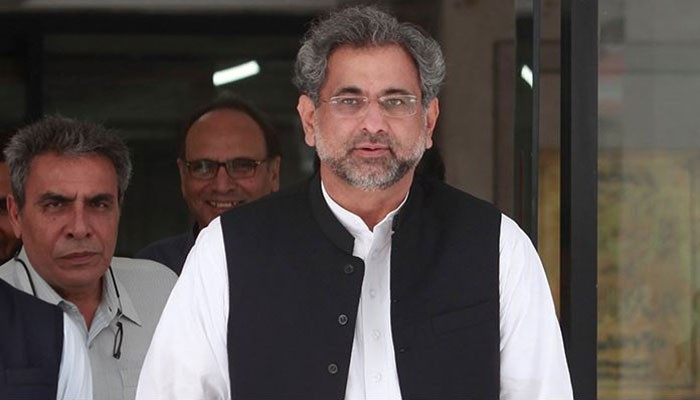PM to represent Pakistan at UNGA session beginning Monday
September 18, 2017
UNITED NATIONS: Prime Minister Shahid Khaqan Abbasi is set to represent Pakistan at the 72nd session of the UN General Assembly beginning this week, in which more than a hundred world leaders are scheduled to take part.
PM Abbasi will address the Council on Foreign Relations and will interact with the US-Pakistan Business Council, along with holding bilateral meetings with a number of world leaders and the secretary general of the United Nations on the sidelines of the session.
He will also have extensive interaction with the international media.
Presidents, prime ministers and other top-level delegates will engage in the week-long debate which follows the theme "Focusing on People: Striving for Peace and a Decent Life for All on a Sustainable Planet".
"The UN was created for people," the president of the General Assembly, Miroslav Lajcak, said in his opening address on September 12. "The people who need the UN the most are not sitting in this hall today," he told delegates from around the world.
"They are not involved in the negotiation of resolutions. They do not take the floor at high-level events. It is one of the tasks of the General Assembly to make sure that their voices can still be heard."
Massive security arrangements have been put in place around the UN headquarters in New York ahead of the high-level session, in which US President Donald Trump will deliver his first address at the United Nations on Tuesday.
The US is traditionally the second speaker on the opening day of the General Debate, after Brazil.
PM Abbasi, who arrives in New York today from London, will address the assembly on Thursday.
In his debut address before world leaders, he will outline Pakistan's positions on key international political, social and development issues of vital concern to the country.
Talking to Geo News, Pakistan’s permanent representative to the UN, Dr Maleeha Lodhi, said that the prime minister will raise the Kashmir dispute at the session, especially now that the dialogue process between New Delhi and Islamabad is stalled.
"When the bilateral track (talks) has been stopped in its tracks by the present Indian government, then, I think, for Pakistan to raise the issue of Kashmir internationally becomes even more important," Ambassador Lodhi said.
"It is very important for the international community to hear Pakistan, and they will hear Pakistan. They will hear Pakistan loud and clear."
Abbasi is also scheduled to hold bilateral meetings with US Vice President Mike Pence and UN Secretary-General Antonio Guterres.
A statement issued by the Foreign Office in Islamabad underscored Pakistan's advocacy of multilateralism and the United Nations to promote collective responses to the multifaceted challenges of global peace, security and development.
The statement said Pakistan would continue its constructive role and engagement at the UN with a view to protecting and promoting its national interests, including on core issues such as Jammu and Kashmir, reform of the Security Council, counter-terrorism, human rights, peacekeeping, and a host of development and other matters.
UN chief raises voice for Rohingya Muslims
Ahead of the session, UN Secretary-General Antonio Guterres highlighted the grave situation confronting Myanmar's persecuted Rohingya Muslims.
He called for Muslims from the country's Rakhine state to be granted nationality or at least a legal status that would allow them to lead a normal life, while also urging the international community to help provide assistance for the nearly 400,000 people who have fled into Bangladesh.
"I call on the Myanmar authorities to suspend military action, end the violence, uphold the rule of law, and recognize the right of return of all those who had to leave the country," the Secretary-General said in his first press conference since the opening of the Assembly's 72nd session.
Guterres repeated his call for 'an effective action plan' to address the root causes of the situation, which he said has been left to fester for decades and has now escalated beyond Myanmar's borders, destabilising the region.
On the margins of the session, ministerial-level meetings of many regional and sub-regional organisations will be held, including OIC, NAM, G-77, ECO, SAARC, Commonwealth, D-8 and others.
A meeting of the OIC Contact Group on Jammu and Kashmir will also be held.














